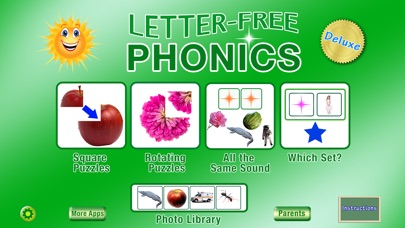
LETTER-FREE PHONICS for School
Desarrollador PRESCHOOL UNIVERSITY
This app will give your child phonemic awareness skills.
Research shows that phonemic awareness is a powerful predictor of success for learning how to read (Stanovich, 1986; 1993; Share & Stanovich, 1995).
Letter Free Phonics will help prepare your child to read by helping your child learn the primary sounds of the letters of the alphabet.
Letter Free Phonics gives a solid foundation for your child to learn the alphabetic principle.
Letter Free Phonics will help your child identify the beginning sounds of words.
Letter Free Phonics will help your child understand that words are made up of sound units (phonemes).
Children with high phonemic awareness outperformed those with low phonemic awareness on all literacy measures, whether they were taught using a traditional basal instruction or whole language (Griffith, Klesius, & Kromrey, 1992).
The purpose of Letter Free Phonics is to help build foundational reading skills for your child. This app helps your child develop their ability to listen for and discern sounds at the beginnings of words. An example of this would be the child recognizing that the /b/ sound is at the beginning of the words ball, bat, and balloon. By practicing and mastering the games in this app, your child can develop neural pathways in their brain relating to sound recognition. When your child is introduced to the printed letters, your child will already recognize the primary sound each letter makes. This will make learning the alphabet easier than if no phonemic instruction were given to your child.
The title of this app was chosen specifically to let users know that no letters would be used in the mechanics of app gameplay. This app focuses on helping children develop pre-letter skills of phonemic awareness. Phonemic awareness is an often overlooked or neglected skill that can greatly benefit early childhood reading skills. Many children are not given the much-needed explicit instruction of the SOUNDS that the letters make. In this app, only the SOUNDS of the letters are used and NEVER the letters or the names of the letters. This app is dedicated to helping children learn the sounds and functions of letters.
The first two games of this app are to introduce the sounds of the letters indirectly while your child does two different types of puzzles. Each time a piece is moved correctly, the app will say the sound that is at the beginning of the featured image- the /c/ sound at the beginning of the word, cat. The combination of a letter sound with an image is designed to train your childs ear and brain to recognize and associate each image with its corresponding beginning sound. This is to introduce to your child the understanding of how words are made up of sounds.
The other two games in this app have children matching images to sound stars. This gives children the chance to practice the indirect learning of sounds from the first two puzzle games. In the second two games, children are directly learning and developing their phonemic awareness skills.
These games are designed so that children can do them independently after being given the basic instructions. The app uses built-in feedback mechanisms to provide assistance and clear direction that allows children to work at their own pace without pressure or hurry. These feedback mechanisms allow children to self-correct their own work. The child does not need a parent or teacher hovering over her to tell her what is right or wrong, or which images should be dragged to which sound tiles. Instead, the apps feedback mechanisms support her learning by giving her clear, gentle, natural consequences. This set-up helps foster stress-free independent learning and optimum performance. The goal is not to tell the child what the answers are but for the child to discover through her own learning what the answers are—to build skills with practice. This process creates a deeper level of learning and creates more neuron pathways than if she were just told the answers.



